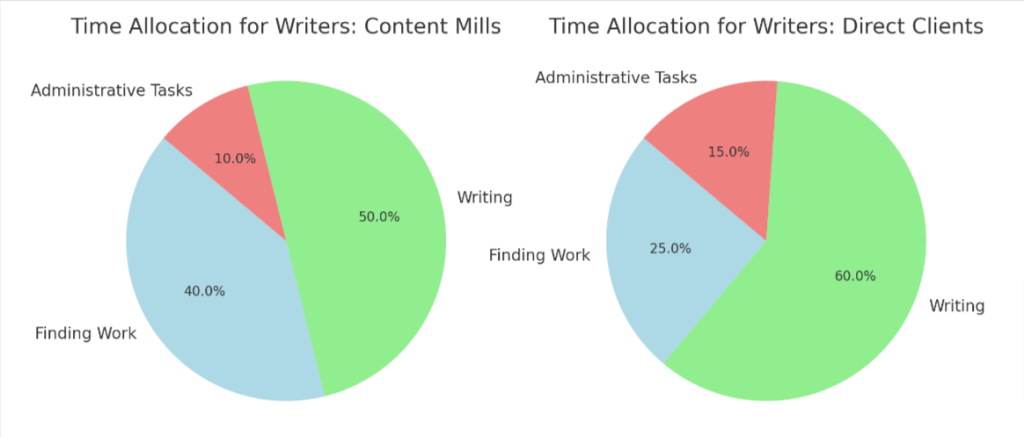Choosing Your Writing Path: Content Mills vs. Direct Clients
Are you teetering on the fence between content mills and direct clients for your freelance writing? With the rise of digital platforms, this dilemma has become more pronounced for wordsmiths.
In this blog post, we delve into these two avenues, highlighting their pros and cons to help you make an informed decision. Stick around to uncover which path suits your writing aspirations best.
Key Takeaways
- Content mills provide a steady stream of assignments and can be a good option for new writers looking to gain experience and build their portfolio, but the pay is often lower.
- Private clients offer more control over rates, direct relationships with clients, and the ability to choose projects aligned with your interests, but it requires effort to find and retain clients.
- Consider factors such as your writing goals, time management preferences, income potential, and networking opportunities when deciding between content mills and private clients.
Understanding Content Mills and Private Clients
Content mills are online platforms that connect freelance writers with clients who need high volumes of content. These platforms offer a wide range of writing opportunities, from web content to copywriting services.
On the other hand, private clients refer to individuals or businesses that directly hire freelance writers for their specific content needs. While both options have their pros and cons, it’s essential to understand the differences before deciding where to focus your writing efforts.
Pros and cons of content mills
Content mills, though sometimes criticized, can be a valuable resource for writers in several ways. However, like any opportunity, they also come with their own set of drawbacks.
| Pros | Cons |
|---|---|
| Content mills provide consistent work and a steady stream of assignments. | The pay is often lower than what could be made from private clients, reflecting the quantity-over-quality approach. |
| They provide a platform for new writers to gain experience and build a portfolio. | There’s often little opportunity to form meaningful relationships with clients, as work is typically impersonal and high turnover. |
| With content mills, there’s no need to hunt for work. Assignments come to you. | There’s a lack of creative freedom as topics and formats are usually predetermined. |
| The process is streamlined with the content mill acting as a middleman handling payments and conflict resolution. | It can be tough to stand out or advance due to the vast pool of writers. |
Self-publishing for authors
Self-publishing presents authors with a unique opportunity to control their creative process. It’s an alternative path in the world of literacy, where writers take charge of every aspect, including writing, editing, designing and marketing.
This freedom allows them to dictate the pace of work which traditional publishing houses cannot offer.
However, self-publishing also poses its challenges. Authors bear the costs for editing services and cover design which can be substantial. Moreover, they need to promote their book on social media platforms or hire professional help- tasks often handled by traditional publishers.
Despite these challenges, self-publishing remains attractive as it offers higher royalties than traditional publishing routes. This makes self-publishing a compelling choice for those able and willing to handle all aspects of book production.
Pros and cons of private clients
Working directly with private clients can offer a unique set of advantages and challenges. This approach may require more effort initially, but it can provide more control over your work, rates, and relationships. Here’s a quick look at the pros and cons:
| Pros | Cons |
|---|---|
| You have control over your rates. | It requires more effort to find and retain clients. |
| You build direct relationships with clients. | There’s no guaranteed stream of work. |
| You can choose projects that align with your interests. | You may have to handle client disputes and issues yourself. |
| There’s potential for consistent, long-term work. | There may be more administrative tasks like invoicing and contracts. |
Remember, the best choice depends on your personal goals, skills, and circumstances. Consider these factors carefully before deciding where to place your focus.
Factors to Consider When Choosing Between Content Mills and Private Clients
When choosing between content mills and private clients, it is important to consider factors such as your writing goals and aspirations, time and workload management, income potential and stability, as well as networking and referrals opportunities.
Your writing goals and aspirations
As a freelance writer, it’s crucial to consider your writing goals and aspirations when deciding between content mills and private clients. Whether you’re looking to make a steady income or gain exposure for your work, understanding what you want to achieve will help guide your decision-making process.
If you have ambitious writing goals, such as publishing novels or becoming an expert in a specific niche, private clients may offer more opportunities for growth and development. On the other hand, if you’re just starting out or prefer a more flexible schedule with high volumes of work, content mills might be the right choice.
Ultimately, aligning your writing goals with the type of client you choose can lead to greater satisfaction and success in your freelance career.
Time and workload management
Effective time and workload management is crucial when deciding between content mills and private clients. As a freelance writer, it’s important to consider how much control you have over your schedule and the amount of work you can handle.
With content mills, you may have tight deadlines and a high volume of assignments, which could lead to a heavier workload. On the other hand, working with direct clients allows for more flexibility in managing your time and workload as you negotiate deadlines and choose projects that align with your availability.
Ultimately, finding the right balance will ensure that you can meet client expectations while maintaining a healthy work-life balance.
Income potential and stability
Freelance writers consider income potential and stability when deciding between content mills and private clients. Content mills offer a high volume of work, but the pay is typically lower and can be unpredictable.
On the other hand, working with private clients can provide higher pay rates and more stable income. It’s important to weigh these factors against your financial goals and desired level of consistency in earnings when choosing where to write.
Networking and referrals
Networking and referrals play a crucial role in the success of freelance writers. Building a strong professional network can open doors to new opportunities, while referrals from satisfied clients can lead to more work.
By attending industry events, joining online writing communities, and connecting with fellow writers on social media platforms, you can expand your network and increase your chances of finding higher-paying gigs.
Additionally, maintaining good relationships with clients can result in valuable referrals that bring in steady work. So take the time to nurture your connections and leverage them for future writing endeavors.
Tips for Striking a Balance Between Content Mills and Private Clients
Manage multiple clients efficiently, set clear boundaries and expectations, diversify your portfolio with different types of writing gigs, and leverage your successes to attract more opportunities in the freelance writing industry.
Efficiently managing multiple clients
Managing multiple clients efficiently is crucial for freelance writers. Here are some tips to help you stay organized and productive:
- Prioritize your tasks based on deadlines and importance.
- Use project management tools or apps to keep track of assignments and deadlines.
- Set realistic expectations with clients regarding turnaround times.
- Communicate clearly and consistently with each client to avoid misunderstandings.
- Create a schedule or routine that allows you to allocate dedicated time for each client.
- Delegate or outsource tasks when necessary to lighten your workload.
- Avoid overcommitting yourself by carefully evaluating the capacity of your available time and resources.
- Develop strong time management skills, such as setting boundaries and avoiding distractions.
- Maintain open lines of communication with clients, updating them on progress regularly.
- Continuously evaluate and assess your workload, making adjustments as needed to ensure a healthy work-life balance.
Setting boundaries and expectations
Setting boundaries and expectations is crucial when working with both content mills and private clients. It helps you maintain a healthy work-life balance and ensures that everyone involved understands what is expected. Here are some tips to help you set boundaries and expectations effectively:
- Clearly define your availability: Communicate your working hours and availability to both content mills and private clients. Let them know when you can be reached and when you are off-limits.
- Establish project timelines: Discuss deadlines upfront with clients, whether it’s for content mills or private clients. Make sure both parties agree on realistic timelines to avoid any misunderstandings or rushed work.
- Negotiate rates and payment terms: Agree on fair rates with all clients, considering the amount of time and effort required for each project. Also, discuss payment terms such as invoicing frequency, modes of payment, and any advance payments if applicable.
- Communicate preferred communication channels: Inform clients about the best way to contact you – whether it’s email, phone calls, or project management tools. This will streamline communication and prevent unnecessary interruptions.
- Set limitations on revisions: Be clear about the number of revisions included in your services. This helps manage client expectations and prevents endless rounds of revisions that could impact your productivity.
Diversifying your portfolio
Diversifying your portfolio is a crucial aspect of freelance writing. By taking on different types of clients and projects, you can expand your skill set and increase your income potential.
Writing for content mills may offer a steady stream of work, but it’s also important to seek out opportunities with private clients. This allows you to showcase your versatility as a writer and build relationships outside of the content mill world.
Whether it’s ghostwriting books, creating website copy, or writing articles for industry-specific publications, diversifying your portfolio opens up new avenues for growth and success in your freelance writing career.
Leveraging your successes for more opportunities
As a freelance writer, it’s crucial to leverage your successes in order to open doors for more opportunities. When you consistently deliver high-quality content and meet or exceed client expectations, you build a strong reputation within the industry.
This can lead to referrals from satisfied clients, as well as repeat business. Additionally, showcasing your best work on your portfolio or through social media can attract new clients who are impressed by what they see.
By leveraging your successes effectively, you can increase your chances of securing more writing gigs and steadily growing your freelance career.

Conclusion
In the end, the choice between writing for content mills or direct clients depends on your personal goals and priorities. Content mills offer high volumes of work and opportunities to build your portfolio, but they often come with low pay rates and anonymity.
On the other hand, working with private clients allows for better income potential, networking opportunities, and more control over your work. Consider what matters most to you as a writer and make a decision that aligns with your aspirations.

